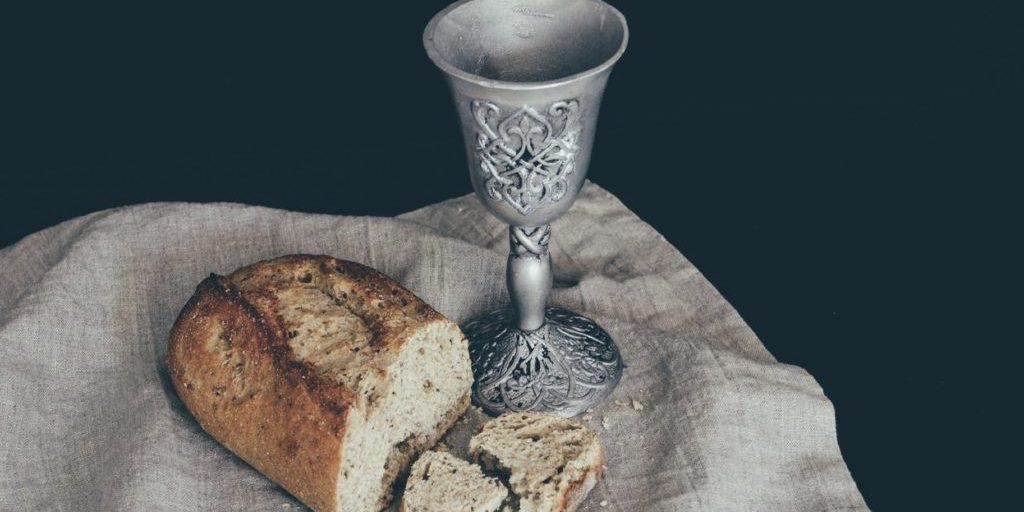
Are You Really Taking the Lord’s Supper?
I joined a “social club” at the Baptist university where I went to college. “Social club” is just private Christian school lingo for fraternity and, like any fraternity, our group had its unique rites and rituals that came as a part of participation in the group. One tradition, taken by some to be the most sacred, was to take the “Lord’s Supper” around the campfire each year, effectively bringing new members into the fold. We passed around a single loaf of bread and all put our lips to one bottle of Welch’s grape juice while someone said a few somber words.
Aside from this being a rather disgusting story (that’s a lot of germs!), we are accustomed to scenes like this one. Christians take Communion with their small group or perhaps even at their wedding. Such familiarity, however, may cause us to forget that however sincere and pious we are trying to be, whatever we are doing when we take bread and juice (or wine) in those settings is something less than taking the Lord’s Supper as Jesus instituted. Jesus gave the Lord’s Supper to local churches to practice together. Anything else is simply not the Lord’s Supper.
Notice that I didn’t say that attempting to take the Lord’s Supper at a wedding, for example, is less than ideal. Instead, the Bible seems to imply that taking the Lord’s Supper without the necessary congregational trappings ends up not being the Lord’s Supper at all. The Apostle Paul says this in 1 Corinthians 11 where he wrote the church at Corinth about their practice of taking the Lord’s Supper. The individualistic culture around them had so infected the hearts and minds of the Corinthians that they began to use the Lord’s Supper as their own personal feast. Paul writes in 1 Corinthians 11:20-21 that when they came together “it is not the Lord’s Supper that you eat,” but rather each one “goes ahead with his own meal.” Even though the elements present and they were in some way partaking during church time, they were failing to partake in the Lord’s Supper together, and thus failing to partake in the Lord’s Supper at all. Not unlike the modern examples above, these Christians were ignoring the horizontal realities of the Lord’s Supper. Or, as Paul puts it, they were failing to “discern the body.”
The phrase “discerning the body” is not an easy one to figure out and has been subject to different interpretations. Paul’s explanation comes in the context of his fencing the table. He labors to make sure that the Corinthians understand the danger of taking the Lord’s Supper in an “unworthy manner,” thus incurring guilt before God Himself (v. 27). Paul implores the Corinthians to have Communion be a time of sober reflection and self-examination. What specifically are they to examine themselves for? The Lord’s Supper should be a time of examining our spiritual state before the Lord in general. But specifically, Paul wants to the make sure they aren’t eating and drinking “without discerning the body” (v. 29). Thus, whatever it means to partake of the Lord’s Supper in an unworthy manner in this text is bound up in whatever it means to fail to discern the body.
Another plausible reading of the failure to discern the body is to say that Paul is warning about partaking of the elements without understanding what they symbolize. Contrary to the Roman Catholic understanding of the Lord’s Supper, the elements are of no benefit to someone who is not united by faith to the crucified and resurrected Christ. The Lord’s Supper is for born-again believers to remember the death of Christ on their behalf and to anticipate His return. Upon this reading, the problem Paul is addressing is that people are taking the Lord’s Supper flippantly without realizing its spiritual nature.
However plausible that interpretation is, it fails to take Paul in context. Remember what he said in verses 20-21. He is going after the Corinthians because they are not celebrating the Lord’s Supper together. Richer Christians are partaking at their leisure, not waiting for poorer members to arrive. Again, they are failing to recognize the horizontal purposes of Communion. They may have well understood the vertical aspects of the ordinance. But in failing to understand that this is a new covenant meal (v. 25), given to the new covenant community (Matt. 18:18-20), they are failing to take the Lord’s Supper. In this way they are failing to “discern the body,” the body being the church, the body of Christ (1 Cor. 12:12-31). The Lord’s Supper identifies the whole membership of the church with Jesus. It is a family meal.
Do you think of the Lord’s Supper as an essentially congregational practice? Even when you take it with your local church, do you think of it as a personal devotional act that you are doing with others in the room? It is vital to marvel at the vertical nature of the Lord’s Supper. Whether you hold that Christ is spiritually present in the Table or that the bread and juice are memorials pointing to the gospel, Christians all agree that there is tremendous individual spiritual benefit from taking the Lord’s Supper.
But if that’s the whole of how you understand the Table, you may not be taking the Lord’s Supper as the Bible defines the ordinance. The horizontal nature of Communion is not incidental; it’s essential to a biblical practice of the ordinance. Jesus purchased the church by His blood and established local churches to be outposts of His Kingdom on earth. He instituted the Lord’s Supper to foster and display the local church’s unity in Christ. The taking of the one bread, Paul says, effectively unites the church as one body (1 Cor. 10:17). The Lord Supper, like a bright yellow line, marks out who belongs to God’s family as the church’s members renew their commitment to one another and to the Lord. Theologian Oliver O’Donovan has said that the church is never more the church than when it takes the Lord’s Supper.
Consider how you might begin to think congregationally about the Lord’s Supper. Here’s one practical bit of advice. Next time you take the Lord’s Supper, take a moment and look around. See who it is that Jesus has died for; see who, before the Lord, it is that you are responsible for and who is responsible for you. Examine yourself, but do so in the company of the redeemed. You all are continuing to affirm each other’s claims to be following Jesus. Relish in the assurance that comes with scores of others are saying “take and eat, this is His body and blood given for you.”
Pastors, you should let this institutional understanding of the Lord’s Supper effect how you teach your congregation. In your remarks before you have the elements distributed, remind the church of how this meal binds them together as God’s holy people, setting them apart from the world to serve Him. Having everyone wait to take the juice at the same time to demonstrate our corporate discipleship to Christ is one thing my pastor does to stress the congregational nature of the Lord’s Supper is. Doing so conditions the church’s members to think of others when they participate in Communion. It may seem little a small measure, but it may go a long way in helping your fellow members “wait for another,” as the Apostle commanded the Corinthians.
The Lord’s Supper is for the local church and the local church only. As you celebrate the Supper with your church, take time and be amazed at the work of God among you. Discern the body and enjoy the Lord’s Supper in the fullness of how our Lord intended.

